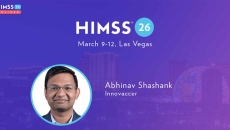HIMSS TV
Virginia Halsey of FDB explains how Model Context Protocols set limits for AI models so they defer to human clinical judgment rather than guessing at answers. This prevents hallucinations that can impact patient safety.
Ovatient CEO Michael Dalton recommends that states use Rural Health Transformation Program money to move beyond hospital-centric care models and supplement local health services with virtual-first primary and specialty care.
General Catalyst's Dr. Stephen Klasko discusses his keynote at the Smart Health Transformation Preconference Forum at HIMSS26, where he'll outline how healthcare can become truly patient-centered by being "tailored to the individual, and made swift."
Shlomi Madar, CEO of SpotitEarly, discusses the company's noninvasive test using a breath sample, which is analyzed by specially trained dogs capable of identifying unique cancer-related scent signatures combined with AI technology.
Pop-ups in EHR interfaces requiring extra clicks that break focus and complicate workflows may be worsening clinician burnout, according to Dr. Michael Zappa, chief clinical officer at Cape Fear Valley Health and physician advisor at Juno Health.
When a small practice suffers a cyberattack, recovery costs may force closures that leave communities without local care options, according to All Covered's Danielle Morrison.
Abhinav Shashank, Innovaccer CEO and cofounder, highlights the company's recently published manifesto, Autonomous Healthcare, and previews his upcoming HIMSS26 panel with other unicorn founders on tackling challenges in health tech.
Emerging Technologies
Esther Kim, head of emerging technologies at Mass General Brigham, shares how the health system evaluates new technologies and decides which innovations to explore while considering clinical need, operational feasibility and scalability.
For his upcoming HIMSS26 presentation, ChristianaCare's Greg O'Neill discusses how practical tools like plain language, pictograms, multilingual translation and tailored discharge instructions can boost medication compliance.
Intermountain Health CISO Erik Decker talks about the SMART toolkit, which identifies critical healthcare functions so leaders can plan ways to keep their organizations running in case of cyberattacks.










